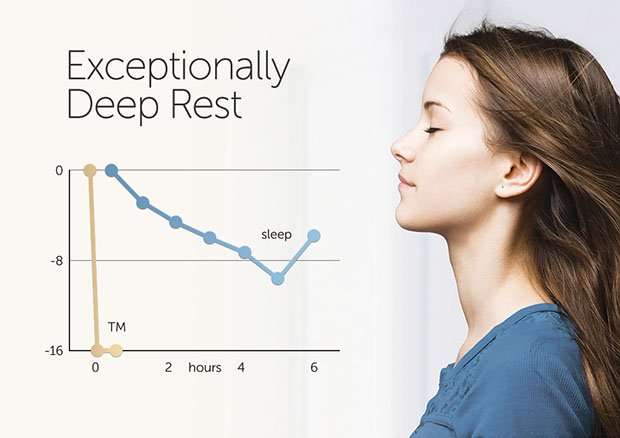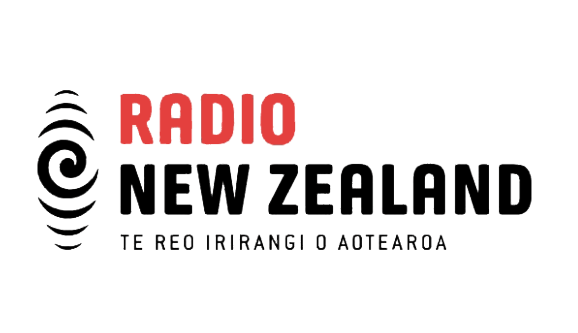1. Introduction to Transcendental Meditation
Transcendental Meditation is a technique developed by Maharishi Mahesh Yogi in the 1950s. Unlike other forms of meditation that focus on concentration or mindfulness, TM involves silently repeating a personal mantra for about 20 minutes twice daily. It aims to transcend active thinking and reach a state of restful alertness.
TM has become one of the most researched meditation methods, especially for its effects on stress-related conditions, including high blood pressure(ScienceDaily)(TM Meditation).
2. The Science Behind Hypertension
Hypertension is often termed the “silent killer” due to its lack of symptoms but serious long-term consequences. It occurs when the force of blood against the artery walls is too high, typically measured as 140/90 mmHg or higher. Chronic high blood pressure can damage arteries and lead to heart disease, strokes, kidney failure, and more. Stress is a significant contributor to high blood pressure because it activates the sympathetic nervous system, leading to a “fight or flight” response that raises heart rate and constricts blood vessels(JAMA Network).
3. How Transcendental Meditation Lowers Blood Pressure
TM works primarily by calming the mind and body, which helps reduce stress. When practiced, TM induces a state of deep relaxation, reducing the release of stress hormones like cortisol and adrenaline. Studies have shown that TM decreases sympathetic nervous system activity, which is responsible for the body’s stress response, and increases parasympathetic nervous system activity, which controls rest and digestion(Nature).
By promoting relaxation, TM helps to:
- Lower heart rate
- Decrease arterial resistance
- Improve overall blood flow
This relaxation response is key to reducing both systolic and diastolic blood pressure(Nature)(ScienceDaily).
4. Clinical Evidence Supporting TM’s Effectiveness
Research into TM’s effects on hypertension is robust, with several randomized controlled trials showing consistent blood pressure reductions. A meta-analysis by the American Heart Association (AHA) found that TM could lower systolic blood pressure by an average of 5 mmHg and diastolic by 3 mmHg. While these reductions might seem modest, they are clinically significant in lowering the risk of cardiovascular events(Meditation).
A study published by JAMA Internal Medicine followed patients with coronary heart disease who practiced TM for 16 weeks. The results showed significant reductions in blood pressure, insulin resistance, and heart rate variability. These findings suggest that TM improves not only blood pressure but also the overall cardiovascular system by reducing stress-related factors like inflammation(JAMA Network)(Nature).
Moreover, a long-term study by Robert Schneider, M.D., demonstrated that individuals who practiced TM had a 40% reduction in the risk of heart attacks, strokes, and deaths compared to those who did not meditate(ScienceDaily).
5. Comparing TM to Other Meditation Techniques
 Not all meditation techniques yield the same benefits for blood pressure. A report by the AHA indicated that while TM has been shown to lower blood pressure effectively, other techniques like Mindfulness-Based Stress Reduction (MBSR) have mixed results and are not recommended for clinical practice as a treatment for hypertension(TM Meditation).
Not all meditation techniques yield the same benefits for blood pressure. A report by the AHA indicated that while TM has been shown to lower blood pressure effectively, other techniques like Mindfulness-Based Stress Reduction (MBSR) have mixed results and are not recommended for clinical practice as a treatment for hypertension(TM Meditation).
TM is unique in its simplicity and ease of practice. It does not require focused attention or effort, making it accessible for people with busy or stressful lives. In contrast, mindfulness and breathing-based techniques may require more mental focus and dedication(Nature)(TM Meditation).
6. Incorporating TM into a Heart-Healthy Lifestyle
For those interested in using TM to lower blood pressure, here are practical steps:
- Find a Certified TM Teacher: TM is taught by certified instructors in a personal one-on-one setting.
- Practice Regularly: Consistency is crucial—20 minutes twice daily is the recommended routine.
- Combine with Other Healthy Practices: A balanced diet, regular exercise, and stress management should accompany TM practice.
- Monitor Your Progress: Regular blood pressure readings will help track the effectiveness of TM.
While TM is not a replacement for medical treatment, it can complement other interventions like medication, diet, and exercise(Nature)(TM Meditation).

How to avoid high blood pressure?
When it comes to maintaining healthy blood pressure, the usual to-do list includes:
- eating healthily,
- exercising,
- keeping away from alcohol and tobacco,
- lowering stress levels.
While it’s hard enough to follow points 1-3, the trickiest question is how to combat stress in a way that would also have the desired effect of lowering your blood pressure.
Whom can Transcendental Meditation help?
Controlled trials show that TM leads to lower blood pressure in:
- people with hypertension [1] [2]
- people with heart disease [3] [4] [5]
- old and young [6] [7]
- under stress or at rest. [8]
Scientists think that TM is effective at lowering blood pressure precisely because it is documented to lower our sensitivity to stress.
In brief, TM makes our nervous system more resilient.
We can therefore avoid the damaging spikes in blood pressure that result from a typical fight or flight reaction to an antsy situation. Instead, we can keep our cool and simply smile!
Reduced blood pressure = longer life
Researchers have also been able to observe how the reduction in blood pressure resulting from practice of TM meditation translates into longer life.
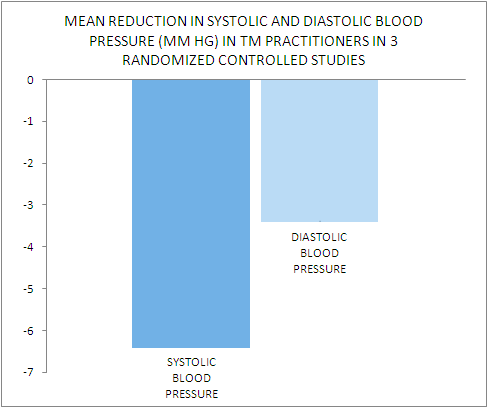 In a controlled study of people over 55 years old and suffering from hypertension, those practicing Transcendental Meditation lived more years in general. Specifically, their rate of mortality due to high blood pressure was decreased by 30%.[6]
In a controlled study of people over 55 years old and suffering from hypertension, those practicing Transcendental Meditation lived more years in general. Specifically, their rate of mortality due to high blood pressure was decreased by 30%.[6]
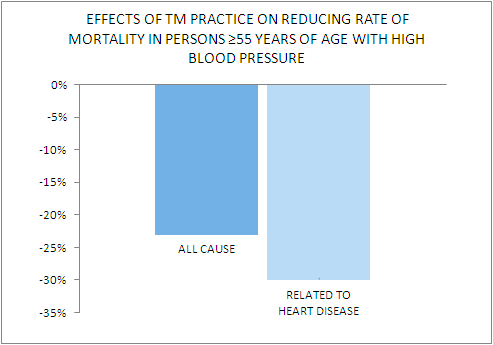
In another study, TM was compared to other methods of stress reduction with regard to its effectiveness in lowering blood pressure.
The study found that stress management training, biofeedback, and relaxation-assisted biofeedback did not lead to any significant reductions in blood pressure. Transcendental Meditation, on the other hand, yielded statistically significant results.[2]
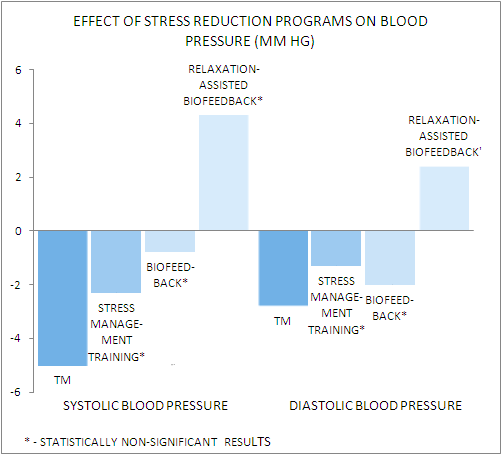
So, to keep your blood pressure in the healthy range, learn TM, and enjoy a long and healthy life!
A Personal Experience
Meet a woman who had her blood pressure checked at the NBC for fitness and health Expo event that suggested she needed to try a different approach to getting her blood pressure under control.
Rosemary Palmer has been meditating for the past six months now. She’s still on medication, but the dosage is lower now. She comments that “eventually you become calmer and you can handle stressful situations more.”
The American Heart Association reports that Americans have high blood pressure more than ever before, which increases the risk of serious medical conditions.
FROM WORLD MEDIA:
 “A new study shows that transcendental meditation, a relaxation technique developed by the Indian guru and made famous when the fab four dabbled with it in the late 60s, can reduce death rates by nearly a quarter.” — “Meditation ‘leads to longer life,’” The Guardian
“A new study shows that transcendental meditation, a relaxation technique developed by the Indian guru and made famous when the fab four dabbled with it in the late 60s, can reduce death rates by nearly a quarter.” — “Meditation ‘leads to longer life,’” The Guardian
 “Transcendental meditation improves blood pressure and insulin resistance in heart patients, according to a placebo-controlled study carried out at an academic medical center in California.” — “Regimens: High Blood Pressure? Meditation May Help,” The New York Times
“Transcendental meditation improves blood pressure and insulin resistance in heart patients, according to a placebo-controlled study carried out at an academic medical center in California.” — “Regimens: High Blood Pressure? Meditation May Help,” The New York Times
 “For millions of people with hypertension an effective alternative therapy may bring blood pressure into the normal range or prevent the need for hypertension medication, with its attendant side effects and costs.” —“American Heart Association: TM May Lower Your Blood Pressure,” The Huffington Post
“For millions of people with hypertension an effective alternative therapy may bring blood pressure into the normal range or prevent the need for hypertension medication, with its attendant side effects and costs.” —“American Heart Association: TM May Lower Your Blood Pressure,” The Huffington Post
 “Transcendental meditation may have as much of an impact for people with hypertension as taking a second medicine, a University of Kentucky research review shows.” — “Tricks to Lower Blood Pressure,” Health.com
“Transcendental meditation may have as much of an impact for people with hypertension as taking a second medicine, a University of Kentucky research review shows.” — “Tricks to Lower Blood Pressure,” Health.com
.
WATCH VIDEO: NBC news report on how doing Transcendental Meditation will help to normalize the blood pressure:
7. Key Takeaways
- Transcendental Meditation effectively reduces both systolic and diastolic blood pressure, making it a valuable tool in managing hypertension.
- Clinical studies support TM’s impact on overall cardiovascular health, reducing the risk of heart attacks, strokes, and death in people with hypertension.
- Unlike other meditation techniques, TM is easy to learn and practice, requiring no special equipment or focused attention.
- Regular practice of TM should be part of a broader strategy that includes lifestyle changes like a healthy diet and exercise.
8. Conclusion
Transcendental Meditation offers a promising, non-pharmacological method to manage high blood pressure and improve cardiovascular health. By reducing stress and promoting relaxation, TM has been shown to effectively lower blood pressure, with research validating its benefits for both short-term and long-term cardiovascular outcomes. Incorporating TM into a comprehensive health plan can help individuals manage their hypertension and enhance overall well-being.
As research continues to support its benefits, TM is gaining recognition within the medical community as a complementary treatment for high blood pressure(ScienceDaily)(Nature)(JAMA Network).





